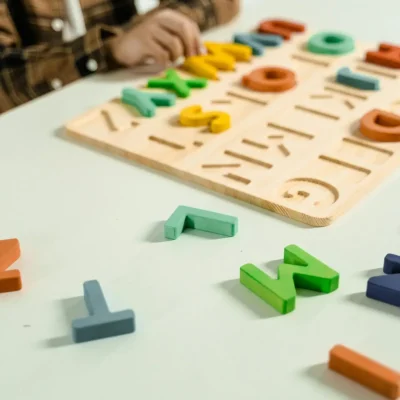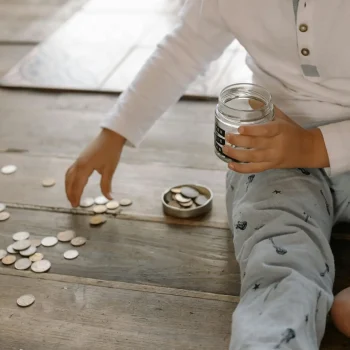How Childhood Experiences Shape Money Behavior
“Show me the child at seven, and I will show you the adult.”
— Aristotle


Money behavior isn’t just about numbers, budgets, or spreadsheets—it’s deeply emotional, often rooted in experiences we don’t even remember clearly. Your relationship with money as an adult is, in many ways, a reflection of what you saw, felt, and absorbed growing up.
Whether you were raised in a household where money was tight or where abundance came with strings, those early experiences shaped your beliefs, habits, and anxieties around money—even if you’ve never stopped to think about it
In this post, we’re digging deep into:
How your childhood shapes your money mindset
Common money scripts we inherit as kids
Ways to identify and unlearn harmful financial behaviors
How to build a healthy, conscious relationship with money as an adult
1. Why Your Childhood Matters More Than You Think
Every child grows up watching adults handle (or mishandle) money. Whether it was:
Hearing arguments about unpaid bills…
Being told “money doesn’t grow on trees”…
Watching your parents hustle paycheck to paycheck…
Or never having to think about money at all…
Those experiences leave emotional imprints. They form the core of your financial identity—your beliefs about money, how it works, and what you’re allowed to have.
This foundation is often laid before the age of 7. That’s when we absorb everything like a sponge—without filters. We don’t just learn facts about money; we learn feelings about money.
2. The 4 Main Money Scripts People Learn in Childhood

According to financial psychologists like Dr. Brad Klontz, we all develop money scripts—core beliefs we carry into adulthood. These aren’t “right” or “wrong,” but they often operate unconsciously.
Let’s break them down:
a. Money Avoidance
Belief: “Money is bad. Rich people are greedy.”
Childhood roots: Grew up in a home where money caused stress or was viewed as immoral.
Adult behavior: May avoid checking bank accounts, under-earn, or feel guilty about wealth.
b. Money Worship
Belief: “More money will solve all my problems.”
Childhood roots: Witnessed struggle and equated money with escape or safety.
Adult behavior: Overworking, overspending, or tying self-worth to income.
c. Money Status
Belief: “My value is determined by my net worth or lifestyle.”
Childhood roots: Saw admiration or status tied to wealth or material things.
Adult behavior: Chasing “success” through cars, clothes, gadgets—regardless of affordability.
d. Money Vigilance
Belief: “Money must be saved and protected at all costs.”
Childhood roots: Grew up with financial insecurity or scarcity.
Adult behavior: Frugal to a fault, anxiety around spending, struggle to enjoy money.
💡 Important: Most people don’t fall into just one category. Your behavior may shift over time or show traits of multiple money scripts.
3. Examples of Childhood Financial Environments (and How They Echo in Adulthood)

Let’s look at some real-world examples of how childhood homes shape adult money behavior.
a. The “We Can’t Afford That” Household
What you heard:
“Money’s tight.”
“We can’t afford that.”
“Don’t ask for things we can’t buy.”What you learned:
That money is always scarce. Even when you earn more, you might feel like it’s never enough.Adult result:
You may under-earn, feel guilty spending, or hoard money due to a fear of running out.
b. The “Money = Love” Household
Lorem ipsum dolor sit amet, consectetur adipiscing elit. Ut elit tellus, luctus nec ullamcorper mattis, pulvinar dapibus leo.
What you saw:
Gifts, treats, or cash used to show affection—or withheld as punishment.What you learned:
That money is tied to approval, control, or love.Adult result:
You may equate giving with love, overspend on others, or feel manipulated by financial favors.
c. The “Money Was Taboo” Household
What you experienced:
Money was never talked about. Finances were a mystery.What you learned:
That money is secret, confusing, or shameful to discuss.Adult result:
You may feel anxious talking about money, avoid learning about it, or fear financial transparency.
d. The “Everything Was Handled for Me” Household
What you experienced:
You never had to think about money; your needs were always covered.What you learned:
That money magically appears or that managing it is someone else’s job.Adult result:
You may feel unequipped to manage your own finances, struggle with independence, or make impulsive choices.
4. How These Patterns Show Up in Adulthood

Even if you think you’ve outgrown your past, these childhood scripts often show up in subtle (and not-so-subtle) ways:
Impulse buying to feel temporarily in control
Avoiding budgeting because it feels stressful or shameful
Over-saving and never enjoying your money
Chronic under-earning or imposter syndrome around wealth
Financial co-dependency in relationships
These behaviors often operate beneath your awareness, making it hard to change them until you shine a light on where they came from.
5. Breaking the Cycle: How to Heal Your Money Story

The good news? You’re not doomed to repeat what you grew up with. Awareness is the first step, but here’s how to truly rewrite your money story.
🔹 Step 1: Uncover Your Money Memories
Ask yourself:
What’s my earliest memory involving money?
What messages did I hear about money growing up?
What emotions come up when I think about spending or saving?
Write these down. Notice patterns, phrases, and feelings.
.
🔹 Step 2: Identify Your Current Money Script
Review the four money scripts above. Which ones resonate with your current behavior?
Are you anxious about spending?
Do you chase money thinking it’ll fix everything?
Do you avoid looking at your finances?
Label your script. This creates distance between you and the behavior.
🔹 Step 3: Challenge the Old Beliefs
Ask:
Is this belief objectively true? Or was it just something I learned as a kid?
What evidence do I have that the opposite might be true?
For example:
“Money is evil” → “Money is a tool—it reflects the user’s values.” “I’m just bad with money” → “I’ve never been taught money skills, but I can learn.”
🔹 Step 4: Rewire Your Habits
Once you identify your script, you can reprogram your behavior.
If you’re a money avoider, start by looking at your bank account once a day.
If you’re money worshiping, try a spending freeze to learn contentment.
If you’re overly vigilant, practice small “guilt-free spending” each week.
Tiny, consistent actions slowly change the way your brain relates to money.
🔹 Step 5: Learn Financial Skills—Emotionally
Traditional financial education often skips emotional intelligence. Combine both.
Read personal finance books and mindset books.
Use budgeting apps and journaling tools.
Take online courses and seek therapy if needed.
Healing your financial life is both practical and emotional work.
6. Breaking Generational Patterns: Be the Cycle-Breaker

If you grew up with financial instability, stress, or avoidance, you may be the first in your family to take control of your money.
That’s a big deal.
You’re not just learning for yourself—you’re changing the financial legacy for your kids, siblings, community, or future generations.
It’s hard work. But it’s powerful work.
7. Helping Your Children Develop a Healthy Relationship With Money

✅ Talk about money openly
Use age-appropriate conversations. Don’t make money a taboo.
✅ Involve them in budgeting
Let them help plan groceries or trips. Teach them trade-offs.
✅ Let them earn and spend
Give allowance, but let them make choices—both good and bad. Mistakes are lessons.
✅ Model healthy behavior
Kids absorb how you feel about money more than what you say. Show calm, not panic.
Final Thoughts: Rewrite Your Money Story, One Chapter at a Time

Your past does not define your financial future.
Childhood experiences may have laid the foundation, but you get to decide what you build on top of it. With awareness, reflection, and action, you can replace fear with confidence, scarcity with abundance, and shame with empowerment.
You’re not broken. You’re just carrying a money story that was never truly yours.
Now’s the time to write a new one.
💬 What’s your money story?
Have you ever noticed how your childhood affected the way you save, spend, or earn? Drop a comment below and let’s talk about it. Your story might help someone else feel less alone.